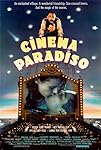
Cinema Paradiso leads us through the life of a man by the name of Salvatore and shows the role cinema played in his life and the lives of the inhabitants of the little Sicilian town of Giancaldo. We see the town’s cultural and technological transformation through the decades after the war.
Some elements of the film work well, like the heartwarming portrayal of the friendship between Salvatore and his mentor Alfredo, and the depiction of local culture in post-war Italy. However, the film falters when it introduces the love story between Salvatore and Elena, a local girl. It is sappy and simplistic. At one point, our lovers are laying on the stones in the pouring rain as they kiss. It looks very romantic, until you realise that this would be extremely uncomfortable and makes no sense.
As the story returns to the present day, Salvatore goes back to Giancaldo, and the love of his youth is, of course, still there. This is when the movie becomes overly sentimental and a bit boring, as it refuses to wind down yet struggles to find meaningful material. The film is almost 3 hours long, but feels far longer, because the shots are drawn-out and the pacing comes to a crawl, especially towards the end. Cinema Paradiso just refuses to finito when it should.
With the themes being what they are, the film will appeal to those interested in Sicilian post-war culture and specifically in the art of filmmaking (Giuseppe Tornatore’s love for cinema is probably far greater than yours or mine). Without a strong connection to these themes, what remains is the relationships of Salvatore with his mentor and the love story with Elena, which may not be compelling enough to sustain interest.
The standout performance is Alfredo, played by Philippe Noiret. As for Salvatore himself, you can be the judge. A good chunk of the film is set during his childhood, where the role is given to the boy by the name of Salvatore Cascio and this kid was probably encouraged to overact. His delivery can be quite irritating but also endearing at times. The teenage Salvatore is alright, but his performance doesn’t stand out.
The cinematography is warm and cozy, just like Italy itself. Ennio Morricone’s score is a major contributor to the film’s emotional weight and is recognizable, with its dramatic longing strings. The main theme lingers in the mind. Everything is a bit melodramatic, but that’s Italy for you.
Cinema Paradiso is a nostalgic celebration of cinema mixed with a sentimental and simplistic celebration of love. If you like the idea of embedding yourself in the culture of the time and don’t mind the simple love story, then this film makes for a rewarding experience, but if you are just an average movie goer expecting a compelling narrative, this film may bore you, particularly in its last act. There is apparently a shorter version of this film. While the critics tend to recommend the full version, the shorter version might provide a more concise and impactful experience.

